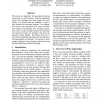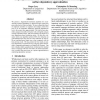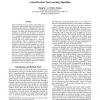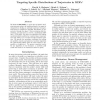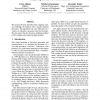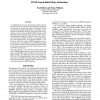127
click to vote
ACL
2004
15 years 3 months ago
2004
We present an algorithm for generating referring expressions in open domains. Existing algorithms work at the semantic level and assume the availability of a classification for at...
118
click to vote
AAAI
2006
15 years 3 months ago
2006
We present an algorithm that derives actions' effects and preconditions in partially observable, relational domains. Our algorithm has two unique features: an expressive rela...
ACL
2004
15 years 3 months ago
2004
We present a linguistically-motivated algorithm for reconstructing nonlocal dependency in broad-coverage context-free parse trees derived from treebanks. We use an algorithm based...
AAAI
2006
15 years 3 months ago
2006
There is growing interest in scaling up the widely-used decision-tree learning algorithms to very large data sets. Although numerous diverse techniques have been proposed, a fast ...
114
click to vote
AAAI
2006
15 years 3 months ago
2006
We define TTD-MDPs, a novel class of Markov decision processes where the traditional goal of an agent is changed from finding an optimal trajectory through a state space to realiz...
ACL
2004
15 years 3 months ago
2004
We present the first algorithm that computes optimal orderings of sentences into a locally coherent discourse. The algorithm runs very efficiently on a variety of coherence measur...
111
click to vote
AAAI
2006
15 years 3 months ago
2006
The impact of learning algorithm optimization by means of parameter tuning is studied. To do this, two quality attributes, sensitivity and classification performance, are investig...
AAAI
2006
15 years 3 months ago
2006
The majority of the existing algorithms for learning decision trees are greedy--a tree is induced top-down, making locally optimal decisions at each node. In most cases, however, ...
AAAI
2006
15 years 3 months ago
2006
As embedded systems grow increasingly complex, there is a pressing need for diagnosing and monitoring capabilities that estimate the system state robustly. This paper is based on ...
AAAI
2006
15 years 3 months ago
2006
This paper develops new algorithms for coalition formation within multi-sensor networks tasked with performing widearea surveillance. Specifically, we cast this application as an ...
